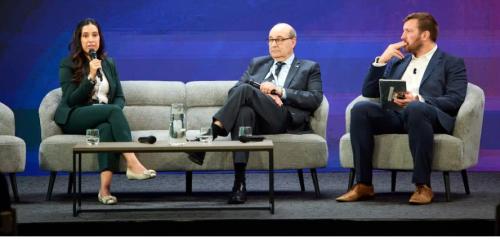The best CSR disclosure award is based on quality and robustness of reporting, including exposure to environmental risk factors such as climate change, employee health and safety, and corporate sustainability.
Suzanne Fallender, director of CSR at Intel Corporation, tells Corporate Secretary that such disclosures can help the company build trust with external stakeholders and get ahead of potential data requests. Highlighting its long-term focus on the issue, Intel published its first environmental report in 1994. The company’s latest report, published at its May 2017 AGM, outlines its performance toward goals and key CSR-related risks and opportunities.
CSR isn’t just about warning of potential dangers, however, and Intel’s report also looks at how the company’s integrated approach to corporate responsibility, using transparency, governance and ethics, creates value for Intel – and therefore its shareholders – by helping to mitigate risks, reduce costs, build brand value and identify new market opportunities.
For the firm’s governance professionals, work began on the latest report in November 2016 and took until May 2017: almost half a year. The process included a great deal of collaboration with other units at the company, as well as meeting with socially responsible investors.
In addition to the full CSR report, which is available online, the company produces a shorter executive summary version that stakeholders can request a printed version of. The 2017 report was redesigned and streamlined with an increased number of graphics to boost readability, and uses a more ‘modular’ format to make it easier to download and focus on specific topics such as water conservation.
Intel has also launched an interactive ‘report builder’ website that enables visitors to create customized reports. The intention is to create efficiency by enabling stakeholders to tailor the information they access, Fallender explains. In addition, the company launched an interactive employee CSR website to share details of the report. This tool is used by employees in their interactions with customers – for example, if they are asked about supply chains.
The 2017 report includes various worthy features, such as being one of the first to use the new Global Reporting Initiative Standards. It includes an expanded discussion of how the company is supporting achievement of the UN Sustainable Development Goals and expanded disclosure on the company’s approach to advancing human rights, with information on a third-party human rights impact assessment and on projects to apply emerging technologies to address human rights challenges.
Fallender says the company is seeing increased expectations from investors and others regarding human rights. As a technology firm, she adds, Intel also addresses the potential of emerging tools such as artificial intelligence, which raises questions about possible new risks as well as ethics and potentially beneficial applications such as helping to end human trafficking.
This article originally appeared in the Winter issue of Corporate Secretary.









